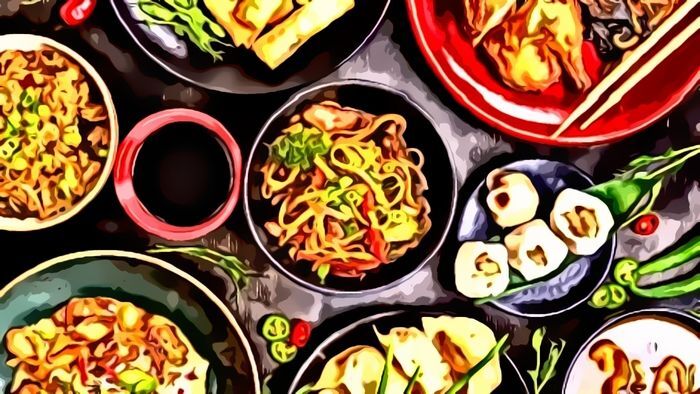IELTS Topic: Food

VOCABULARY & EXPRESSIONS
Go over the following vocabulary and expressions with your tutor. Read the word/expression and definition out loud, and your tutor will go over anything you do not understand. Practice creating a sentence or two to make sure you know how to use the word/expression properly.
Vocabulary/ Expressions
dine in: (Phrasal verb)
dine at home.
I am getting home late today, so we're dining in tonight.
dine out: (Phrasal verb)
dine at a restaurant.
We're dining out tonight at our favorite restaurant.
fussy eater: (Noun)
someone who is very picky about the food and doesn't eat everything.
My husband is a fussy eater, and he's never pleased with my cooking.
home-cooked food: (Noun)
food cooked at home, usually implies that food is healthy.
Preparing home-cooked food is a good way to make a balanced meal.
mouth-watering:(Adjective)
that is to say you find something very appetizing.
My mouth is watering every time I think about my grandmother's apple pie.
processed food:(Noun)
food that has been modified in an undesirable or unhealthy way to achieve its current state.
Try to avoid processed foods like flavored nuts and cereal bars. It is much healthier to eat organic food.
quality justifies the bill: (idiom)
when a product is worth buying due to its good quality, even if it's expensive.
I first thought those strawberries were too expensive, but when I tasted them I understood that their quality justified the bill.
ready meal: (Noun)
a meal that you buy already cooked, which only requires reheating to be eaten.
I had no desire to cook, so I bought a ready meal in a nearby supermarket.
slap-up meal: (Noun)
a quick and fatty meal. To slap-up means to cook something very quickly.
I feel like making a slap-up meal tonight, as I am tired and I dont want to cook.
Take-away / take-out: (Noun)
a meal prepared in a café/restaurant and eaten at home.
I'm going to ring the Japanese restaurant and order a takeaway.
the main meal: (Noun)
the most important meal of the day.
Breakfast and lunch is usually my main meal of the day.
to bolt something down: Verb Phrase)
to eat a large amount of food very quickly.
Don't bolt your food down like that, it's very rude!
to eat a balanced diet: (Noun)
to eat correctly and in time.
A balanced diet is important for one’s health.
to eat like a horse: (Idiom)
to always eat a lot.
She's so thin, yet she eats like a horse.
to foot the bill: (Idiom)
to pay the bill.
You paid for dinner last time. Let me foot the bill for lunch today.
to have a sweet tooth: (Idiom)
to enjoy eating sweet food.
Dave eats candy all the time. He must have a sweet tooth.
to spoil your appetite:(Idiom)
to do something that would hinder your desire to eat.
Stop talking about the snails, you're spoiling my appetite!
to wine and dine: (Idiom)
to banquet, to "entertain with good food".
If you wine and dine, someone, you usually take him out to dinner at a fancy restaurant.
The company wined and dined us, hoping to convince us we should accept the job.
to work up an appetite: (Idiom)
to do something that will lead to hunger.
He must have worked up an appetite in the gym.
PART 1 QUESTIONS
Introduction and interview (4-5 minutes)
Here are possible questions that might come up during the test. Go over them with your tutor.
In the first part, the examiner will ask you a number of general questions
Topic
What foods do you like
What kind of food do you like to eat?
Who usually does the cooking in your home?
Is there any food you don’t like?
When do you usually eat dinner?
Do you often have dinner with your family or friends?
Do you like cooking? (Why?/ Why not?)
What was the last meal you cooked?
Do you prefer home-cooked food or food from restaurants? Why?
What are some reasons that people eat at a restaurant?
Describe a popular food in your country? Why do people like this food?
On what occasions do you eat special foods?
Which foods from your country do most foreign people enjoy?
PART 2 QUESTIONS
Individual long turn (3-4 minutes)
Here are possible questions that might come up during the test. Go over them with your tutor.
You will have 1 minute to prepare to speak, and then you will talk for 2 minutes, during which the examiner will not speak.
Part 2 – sample task card
Sample A
Part 2 Questions
Describe a special occasion when you had a really enjoyable meal.
You should say:
What the occasion was
Who was enjoying the meal with you
What the meal was and how they served it
and explain why the meal was so enjoyable for you.
Sample B
Part 2 Questions
Describe your favorite food or a dish that you like.
You should say:
What ingredients are in this dish
How it is prepared and how long it takes to prepare it
When and how it is usually eaten
And say how popular this dish is in your country and why.
Sample C
Part 2 Questions
Describe a new type of food you tried out for the first time.
You should say:
What the new food was
When and where you tried this new food out
Who you tried it out with
And what you thought about this food and if you would eat it again
PART 3 QUESTIONS
Two-way discussion (4-5 minutes)
Here are possible questions that might come up during the test. Go over them with your tutor.
In the last part, you will talk with the examiner about issues related to the topic on the card.
• Are people in your country generally knowledgeable about healthy and unhealthy foods, do you think?
• What could be the consequences of people’s changes in diet?
• Do you think your government is doing enough to improve people’s diets?
• What can be done to make young people eat healthier food, do you think?
• How important is retaining a country’s traditional food culture, in your opinion?
• Do you believe that people in your country learn enough about healthy eating at school?
• Do you think that restrictions on the sale of very unhealthy foods are a good idea?
• What are the advantages and disadvantages of having a fast-food restaurant in your local area?
• In what ways does packaged food benefit society?
• Do you think there is a danger that your country’s traditional cuisine could disappear?
• How have people’s attitudes to foreign food changed over the last 50 years in your country?
• What are your predictions for people’s diets in the next twenty years?
• Do you think that the food available in supermarkets is getting better or worse? (What makes you say that?)
• Do you think that people’s attitude to chemicals in food is changing?
• Are modern “health foods” really good for us, do you think?

